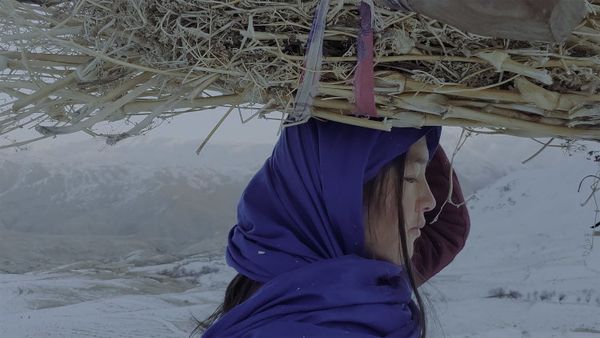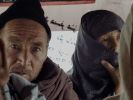Eye For Film >> Movies >> Kamay (2024) Film Review
Kamay
Reviewed by: Sergiu Inizian

Between the echoes of Afghan mountains, we see young Freshta scavenging for the kamay plant, specific to the region. She used to send it to Zahra, her older sister, who was doing research for her thesis in veterinary science. We shockingly discover that anguished by repeated thesis rejections, Zahra committed suicide. The full details remain hidden both to the viewer and to her family. While struggling to survive in a remote community, parents Hawa and Younes attempt to find justice, sensing strongly that their daughter was pushed to suicide, amid rumours of her rejecting the sexual advances of her teacher. Through the naturalist camera of directors Ilyas Yourish and Shahrokh Bikara, the audience is confronted with a stark image of a failed judicial system and the perpetually looming threat of the Taliban.
There's patience in how the documentary pieces together Zahra's image. Her family bears the pain of her appalling death and offers few words about the late daughter. Only Freshta speaks about her sister, but never to the camera. Her subdued voice acts as off-screen narration, while the emptiness of her surroundings provides space to reflect on the status of women within the Afghan educational system. There's palpable tension in how the young woman and her parents process Zahra's death. While she feels compelled to enrol in university and continue her sister's stunted legacy, they fear another nightmare scenario. Freshta sees the risk but wants something of Zahra's to continue living. Tested by sorrow, the risk overwhelms the parents, who only wish to protect the family.

Their feeling is magnified by arduous journeys to Kabul. Seeking justice and attempting to retrieve Zahra's belongings, they embark on days-long bus rides that travel across fundamentalist-controlled territory. The camera alternates here from wide shots of natural beauty to crammed close-ups that speak to a general tension brought by the Taliban's unjustly established checkpoints. This stylistic choice follows the parents in Kabul, who feel lost in the disorderly capital. Bearing the historic persecution against their Hazara people in their hearts, they conduct their business carefully. Finally recovering Zahra's possessions, their quiet recollection of her image turns into shattering mourning. Hawa's silence as they catalogue her daughter's equipment speaks volumes about motherly pain, which only increases with Freshta's upcoming admittance to university.
As the family's patriarch, Younes hides his anguish in pragmatic solutions to the legal case surrounding his daughter’s suspicious death. He is unable to accept a situation in which nobody is held responsible, but his limited resources and historically oppressed status cast him in an unfortunate role. Through his small Nokia phone, he receives news of judicial defeat, demoralising humiliation and a clear message that his family has no support. As the modest camera follows him and his family, the directors dignify his struggle. Against a corrupt society and a menacing regime change that threatens their future, the way his family cherishes and remembers each other stands as a poignant image of resilience.
As the vast emptiness of the barren landscape engulfs the family's small community, the observational camera work allows them to process the pain on their terms. Guided by Freshta's soft voice, the documentary paints a vivid picture of her sister's fight with an unjust system which never accepted her aspirations and perspective. Yourish and Bikara's attempt to shed light on the injustice which led Zahra to her dreadful end ultimately creates a palpable image of a recurring terror that entraps families, communities and ambitious women in cycles of bloodshed.
Reviewed on: 15 Apr 2024
















